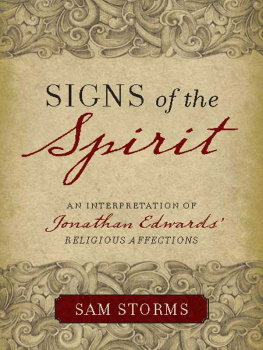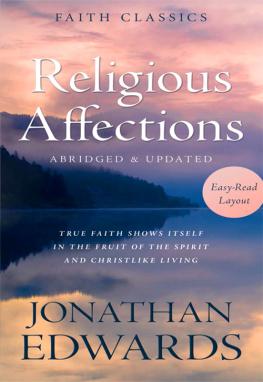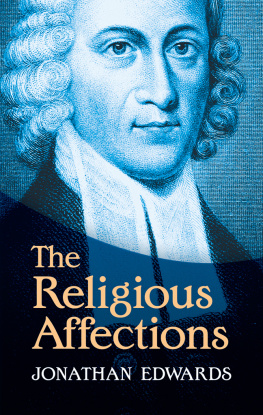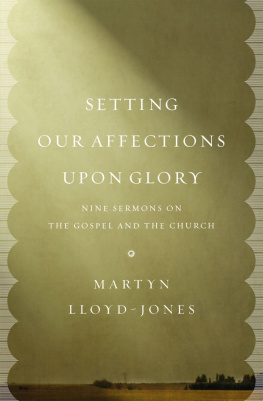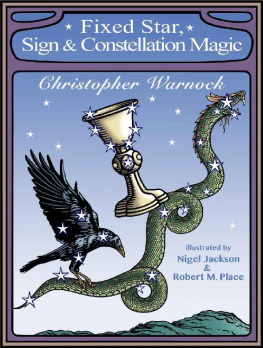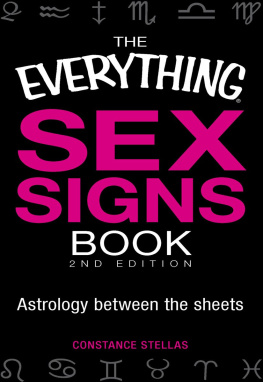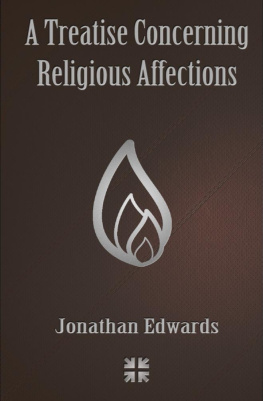Jonathan Edwards Religious Affections remains one of the most discerning works of spiritual psychology published in the last several centuries. Dr. Samuel Storms unpacking of this significant work, along with his treatment of Edwards Personal Narrative, reveals once again for a new generation why the old Puritan so much deserves the most careful study today.
MARK A. NOLL, Francis A. McAnaney Professor of History, University of Notre Dame
Our churches desperately need spiritual discernment, and the Affections constitute perhaps the best manual on discernment ever written. But most Christians cannot wade through the immensity or prolixity of the original text. Therefore Storms repackaging of this spiritual classic meets a serious need. Storms essay on Edwards personal spirituality, introducing the Personal Narrative, is almost worth the price of the book. It is a marvelous synthesis and analysis. Then his running commentary, interspersed with direct selections from the Narrative, are exceedingly helpful.
GERALD R. MCDERMOTT, Professor of Religion, Roanoke College
After nearly 300 years, these gems of Edwards continue to sparkle. It is no exaggeration to say that they stand as two of the best, most profound, and practically useful guides to everyday Christian living ever written. Sam Storms has done a superb job interpreting them for twenty-first century followers of Jesus. His vivid paraphrases are easy to read and always edifying. I pray that many will read and meditate upon this labor of loveand then move on to delve into Edwards own writings.
DOUGLAS A. SWEENEY, Trinity Evangelical Divinity School
These texts of Jonathan Edwards have nourished the church for nearly three centuries, rightfully taking their place as classics. In Sam Storms capable hands theyll now speak clearly, plainly, and powerfully to the church today and for generations to come. If youve ever wanted to tackle Edwards but have shied away, you no longer have an excuse.
STEPHEN J. NICHOLS, author of Heaven on Earth: CapturingJonathan Edwardss Vision of Living in Between
In reading through this book, I feel like I am looking over Sam Storms shoulder, reading Edwards together with him. At times, he pauses to interpret Edwards for me, at other times, he places Edwards comments in their historical context. On rare occasions, he points out areas of disagreement, and at other times, he simply allows the profundity of Edwards own words to speak for themselves. At all times, Sams love and respect for Edwards shines through clearly.
GLENN KREIDER, Professor of Theological Studies, Dallas Theological Seminary


Signs of the Spirit: An Interpretation of Jonathan EdwardsReligious Affections
Copyright 2007 by C. Samuel Storms
Published by Crossway Books
a publishing ministry of Good News Publishers
1300 Crescent Street
Wheaton, Illinois 60187
All rights reserved. No part of this publication may be reproduced, stored in a retrieval system, or transmitted in any form by any means, electronic, mechanical, photocopy, recording, or otherwise, without the prior permission of the publisher, except as provided for by USA copyright law.
Cover design: Jon McGrath
Cover illustration: iStock
First printing 2007
Printed in the United States of America
Scripture quotations occurring within direct quotations from Jonathan Edwards are from the King James Version of the Bible.
Unless marked KJV, all other Scripture quotations are from The Holy Bible,English Standard Version, copyright 2001 by Crossway Bibles, a publishing ministry of Good News Publishers. Used by permission. All rights reserved.
Library of Congress Cataloging-in-Publication Data
Storms, C. Samuel, 1951
Signs of the spirit : an interpretation of Jonathan EdwardsReligious affections / Sam Storms.
p. cm.
Includes bibliographical references and index.
ISBN 978-1-58134-932-0 (tpb)
1. Edwards, Jonathan, 17031758. Treatise concerning the religious affections. 2. Edwards, Jonathan, 1703-1758. Faithful narrative of the surprising work of God. 3. ConversionChristianityHistory ofdoctrines-18th century. 4. EmotionsReligious aspectsChristianityHistory of doctrines18th century. I. Title.
BX7260.E3S76 2007
248.2dc22
2007006232
VP 17 16 15 14 13 12 11 10 09 08 07
15 14 13 12 11 10 9 8 7 6 5 4 3 2 1
Affectionately dedicated to:
LYLE AND MARY DORSETT
Faithful friends, Lovers of God, Devoted to the Church
Ann and I will be forever grateful for your
sacrificial support, loving prayers, shepherds heart,
and
godly example
CONTENTS
ASIDE FROM THE biblical authors themselves, no one has had greater influence on my life than Jonathan Edwards. I first became acquainted with him at the urging of Dr. John Hannah, longtime professor at Dallas Theological Seminary, from which I received my Th.M. in historical theology in 1973. John suggested that I undertake an independent studies course in Edwards and that I begin by reading his treatise on the Freedom of the Will (which eventually led to my writing a masters thesis on that volume). My first exposure to Edwards Religious Affections came when John also insisted that it be included in the list of readings. I will forever be grateful for his wise counsel!
Because of the profound and truly life-changing influence that Edwards has exerted on me, I am quick to recommend his works to others, indeed, to everyone. This brings me to my defense of this interpretation of his treatise on the Affections. If people heeded my advice, I would hardly have undertaken this project. Nothing grieves me more than to hear that yet another has started reading Edwards only to give up, frustrated by his style or overwhelmed by the complexity of his argumentation.
I cant begin to count the number of times Ive been asked for recommended reading and have suggested Edwards (specifically the Religious Affections), only to be greeted with a contorted face or an embarrassed evasion that goes something like this: Well, I tried reading Edwards. I really wanted to read the Affections, but after about fifteen or twenty pages into it, I just quit. For whatever reason, I couldnt follow him. His style was aggravating and, well, to be honest, I just couldnt understand what he was saying.
Such confessions have come not only from average lay folk, but from well-educated seminary graduates as well. Edwards penchant for torturously complex sentence structure, together with the abundance of theological bunny trails that, at least initially, dont seem to contribute to the point he is making, have tested and all too often triumphed over the determination of even the most avid and intellectual of Christians.
For years I have taken the high ground when it comes to the reading of Edwards, refusing to yield to the insistent demand that someone tweak his prose or paraphrase his theological concepts. I have faithfully exhorted countless men and women, again and again, to renew their commitment to working through some of Edwards more daunting treatises. Your patience and perseverance will reap a bountiful harvest, I have said again and again, to little (or no) avail Ive come to discover. Sure, there are a few, here and there, whove made their way through the Affections and were (justifiably) proud of their journey. But even in the majority of these cases, they arent sure they understood, far less appreciated and embraced, what they had read.
Next page
